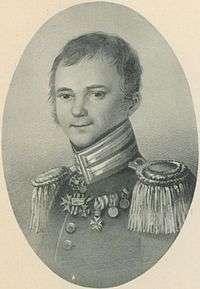Fyodor Glinka
| Fyodor Nikolaevich Glinka | |
|---|---|
 | |
| Born | 1786 |
| Died | 1880 (age 94) |
| Occupation | Poet & Author |
| Nationality | Russian |
Fyodor Nikolaevich Glinka (Russian: Фёдор Никола́евич Гли́нка; IPA: [ˈfʲɵdər nʲɪkɐˈlajɪvʲɪtɕ ˈɡlʲinkə]; 1786–1880) was a Russian poet and author.
Biography
Glinka was born at Sutoki, Smolensk Governorate in 1786, and was specially educated for the army. In 1803 he obtained a commission as an officer, and two years later took part in the Austrian campaign. His tastes for literary pursuits, however, soon induced him to leave the service, whereupon he withdrew to his estates in the government of Smolensk, and subsequently devoted most of his time to study or travelling about Russia.[1]
Upon the Napoleon's invasion of Russia in 1812, he re-entered the Russian army, and remained in active service until the end of the campaign in 1814. Upon the elevation of Count Milarodovich to the military governorship of St. Petersburg, Glinka was appointed colonel under his command.[1]
After the Decembrist Revolt Glinka was suspected of revolutionary tendencies. He was banished to Petrozavodsk, but he nevertheless retained his honorary post of president of the Society of the Friends of Russian Literature, and was after a time allowed to return to St. Petersburg. Soon afterwards he retired completely from public life and died on his estates at the age of 93.[1]
Works
Glinka's martial songs have special reference to the Russian military campaigns of his time. He is also known as the author of the descriptive poem Karelia (1830), and of a metrical paraphrase of the book of Job, which was praised by D.S. Mirsky as the finest religious poetry in the language. His fame as a military author is chiefly due to his Pisma Russkago Ofitsera ("Letters of a Russian Officer") (8 vols., 1815–1816).[1]
Family
Glinka was the younger brother of Sergy Nikolaevich Glinka.
References
- 1 2 3 4 Chisholm 1911.
- Attribution
 Chisholm, Hugh, ed. (1911). "Glinka, Fedor Nikolaevich". Encyclopædia Britannica. 12 (11th ed.). Cambridge University Press. p. 122.
Chisholm, Hugh, ed. (1911). "Glinka, Fedor Nikolaevich". Encyclopædia Britannica. 12 (11th ed.). Cambridge University Press. p. 122.